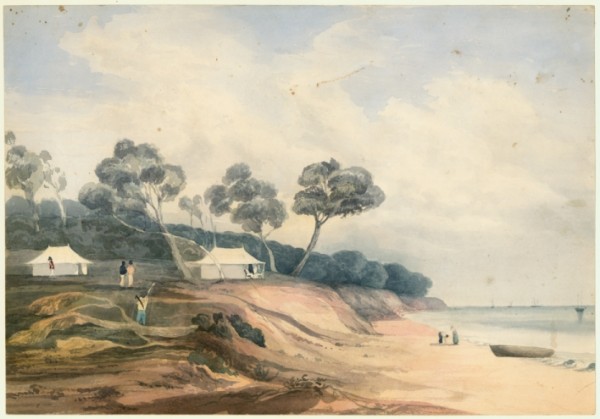The initial excitement of arriving at their destination is dissipating fast as Captain Morgan, Samuel Stephens and the passengers confront the realities of their new situation. Their first concerns are finding fresh water and providing for one of the passengers, Mrs Beare, who is described as being ‘in a deranged state of mind’. Getting her into a tent on shore is an urgent priority.
That task achieved, Captain Morgan and Samuel Stephens resume their explorations and finally meet with two of the men, Henry Wallan and John Day, who are unofficial residents on the Island. They visit their ‘nice little farm’, buy some pigs and vegetables and invite them to visit the ships with their Aboriginal female companions. A cordial relationship is soon established and Henry Wallan agrees to work for Samuel Stephens for three months, for the sum of £1/10sh and provisions.
-

Mr Beare’s tents, Nepean Bay, Kangaroo Island. ca. 1836. By Colonel William Light.
Here the cordiality ends. For the first time a passionate argument erupts between Stephens and Captain Morgan over a perceived slight. It emerges that Morgan has serious concerns about some of Stephens‘ behaviour, particularly towards Mrs Beare, but we also see the first hint of a personal attachment developing between Stephens and Miss Beare, despite the disparity in their ages. The crews of both vessels are also disaffected and positively refuse to unload either cargo or passengers unless they are paid. The South Australian venture sees its first strike – within a week of landing! Stephens must hand over £90 to the crew to entice them to resume work.
At sea
There is trouble also at sea. On the Africaine, Mary Thomas is both distressed and angry to find that her much–loved cat has been thrown overboard during the night by a group of the passengers. The crew is also incensed. Much superstition surrounds cats on board and harming a cat is believed to bring bad luck. The crew threatens retribution against the culprit/s should they be found. Not surprisingly, no one owns up. Mary has her suspicions however and pins up a poem about the incident where everyone can read it. Many years later she finds that she was right.
Oddly enough, cats are also a problem on the Buffalo, but this time because there are too many of them. George Stevenson manages to remove some before the ship leaves St Helens, and orders the emigrants’ deck to be cleansed to get rid of the stench they have created. Ironically he still believes that cats ‘are probably valuable in the colony’ – a remark that we now find hard to understand. On a lighter note, the Misses Hindmarsh set about trying to entertain their fellow passengers, as befits young ladies. They produce two editions of a hand written journal, the ‘Buffalo Telegraph’, which Stevenson dismisses as exhibiting ‘scarcely a redeeming point of intelligence or wit’. Since he is secretary to the Governor, we can assume that he probably keeps this view to himself for the time being!
Language warning
Please note that these sources contain language which is today considered offensive. It has been retained as it is part of the historical record and evidence of past attitudes.


Comments or Questions: